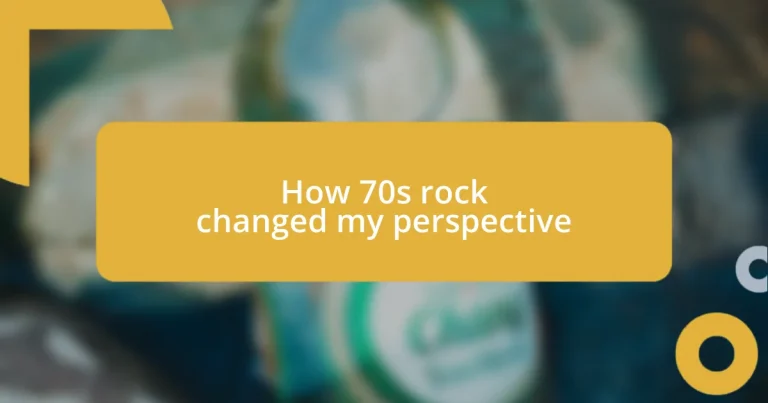Key takeaways:
- The 1970s rock music era was marked by diverse styles and emotional depth, becoming an anthem for personal and societal change.
- Key artists like Led Zeppelin, Fleetwood Mac, and David Bowie influenced personal growth, encouraging self-reflection and individuality through their lyrics.
- Listening to 70s rock taught valuable life lessons about vulnerability, resilience, and embracing change, impacting personal perspectives and relationships.
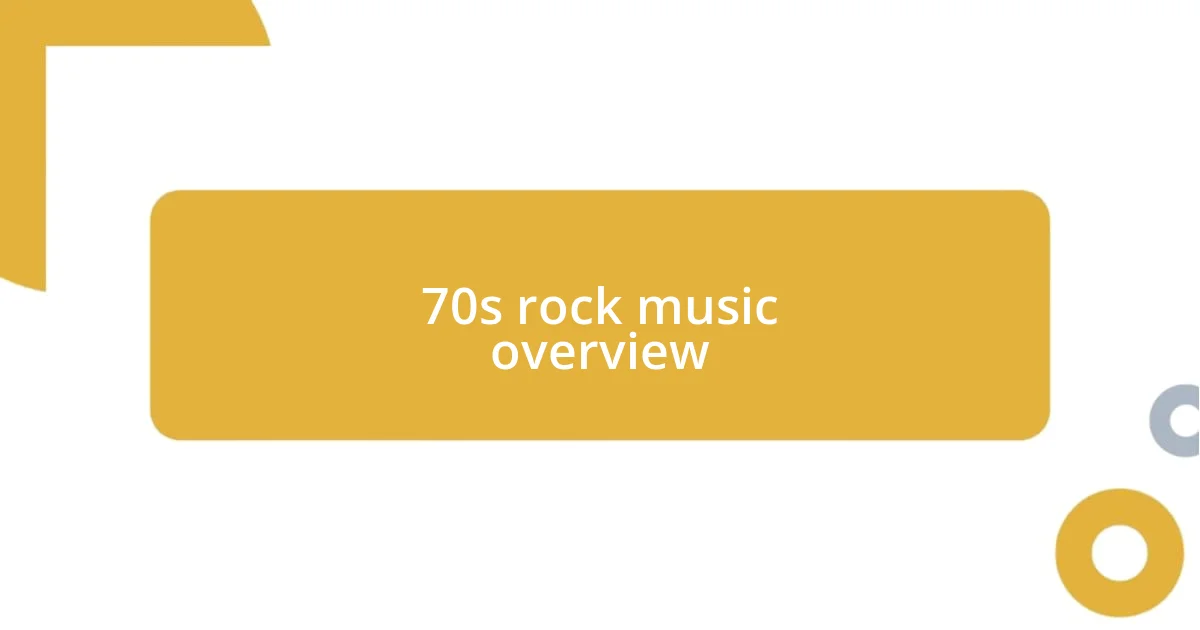
70s rock music overview
The 1970s was a vibrant era for rock music, blossoming with a diverse array of styles and influential artists. I remember the first time I heard Led Zeppelin’s “Stairway to Heaven” — it felt like the soundtrack to my own awakening, and I couldn’t help but wonder, how did a song manage to capture so many emotions in just one track? From the powerful riffs of classic rock to the experimental sounds of progressive rock, the decade became a rich tapestry woven with the threads of rebellion and creativity.
As the decade unfolded, rock began to splinter into numerous sub-genres, such as punk and glam rock. I recall attending a local punk show where the raw energy was palpable; it made me question the status quo in a way I never had before. Was this just music, or was it a movement that spoke volumes about societal change?
The lyrics of 70s rock often delved into personal and societal issues, resonating deeply with listeners. I often find myself reflecting on how songs like Fleetwood Mac’s “Go Your Own Way” resonated with my own experiences of love and loss, leaving me pondering, isn’t it remarkable how music can articulate our innermost feelings? This emotional connection is what made 70s rock not just music, but an anthem for a generation.
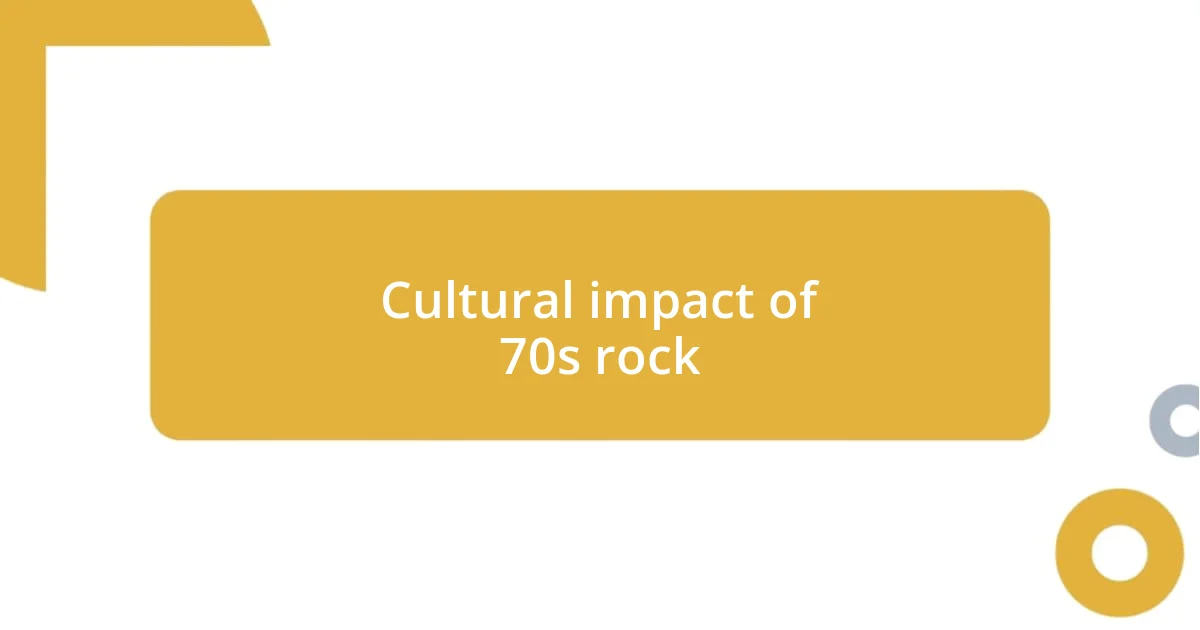
Cultural impact of 70s rock
The cultural impact of 70s rock was nothing short of profound. I remember flipping through my parents’ vinyl collection, stumbling upon The Eagles’ “Hotel California.” It wasn’t just a song; it felt like a portal to another world, wrapped in mystery and layered meaning. This genre didn’t merely entertain; it sparked conversations about freedom, identity, and the zeitgeist of the time.
- Rock becomes a voice for change by addressing issues like war and civil rights.
- Artists often fused different genres, creating a more inclusive musical landscape.
- This era inspired fashion trends, influencing styles that still echo today.
- Concerts became communal experiences, uniting fans through shared passion.
- Many rock songs captured the essence of youth rebellion, encouraging individuality.
The music of that decade resonated so deeply that it became part of our cultural fabric. I can still feel the energy of a late-night gathering with friends as we belted out classics from Queen. Each note felt like a celebration of freedom and self-expression, transforming the ordinary into something extraordinary. That collective experience solidified the realization that 70s rock was far more than entertainment—it was a cultural revolution that shaped attitudes and sparked a sense of belonging in those who embraced it.
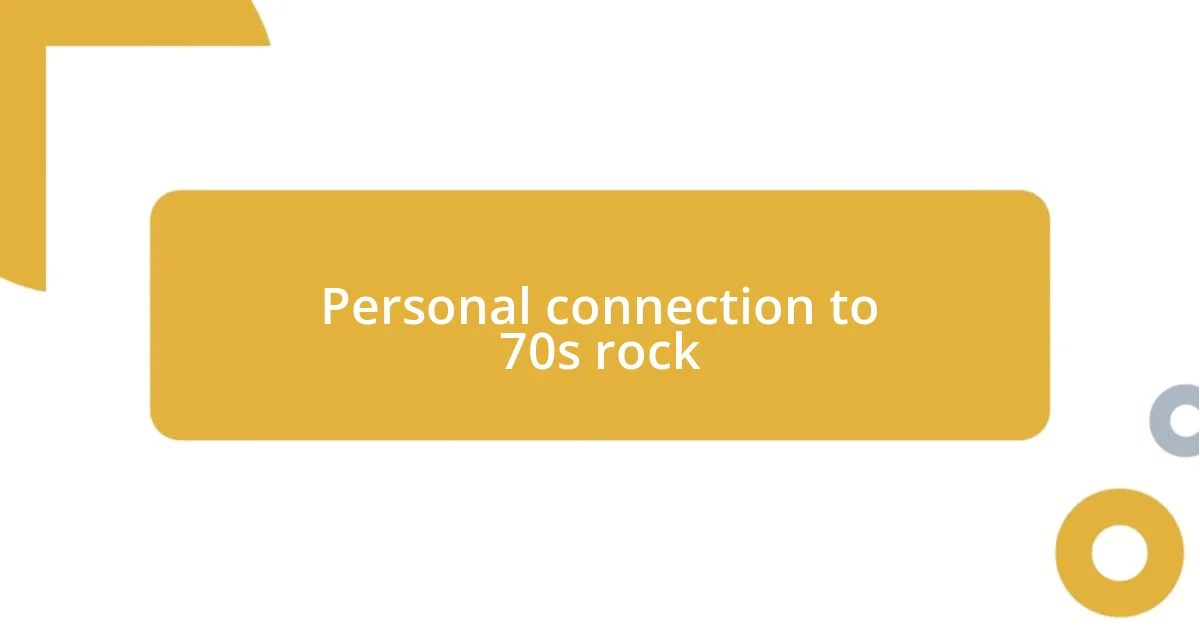
Personal connection to 70s rock
The first time I listened to David Bowie’s “Changes,” I felt like he was narrating my own journey of self-discovery. It startled me to realize how a simple lyric could weave into my personal narrative, capturing the confusion and excitement of growing up. Songs like these weren’t just melodies; they were like companions, guiding me through my formative years.
As I navigated through the ups and downs of adolescence, Boston’s “More Than a Feeling” became an anthem for all my dreams and aspirations. I vividly remember driving down a familiar road, windows down, and feeling an exhilarating sense of freedom with each note reverberating in my chest. It was those moments that illustrated the power of 70s rock—each song felt like a friend cheering me on, resonating with both triumph and vulnerability.
The emotional weight of 70s rock is hard to quantify. I can still recall late-night conversations with my best friend, where we dissected the lyrics of The Who’s “Behind Blue Eyes.” We talked not just about the music, but about our fears and hopes for the future, realizing how deeply these songs echoed our own thoughts. It’s astonishing how this music helped forge connections not just with each other but with our own identities.
| Artist | Key Song |
|---|---|
| Led Zeppelin | Stairway to Heaven |
| Fleetwood Mac | Go Your Own Way |
| The Eagles | Hotel California |
| David Bowie | Changes |
| Boston | More Than a Feeling |
| The Who | Behind Blue Eyes |

Key artists and their influence
Some of the key artists from the 70s left an indelible mark on my perspective, and I can’t help but think about Led Zeppelin. The first time I heard “Stairway to Heaven,” I was entranced by its dynamic journey. It felt as if each guitar riff represented a pivotal moment in my life, urging me to explore deeper meanings within myself and the world around me.
Then there’s Fleetwood Mac with “Go Your Own Way,” which seemed like an echo of my own struggles in relationships during my teenage years. I would play that song on repeat, feeling an odd sense of comfort in its raw emotional honesty. It was like having a friend say, “You’re not alone in this,” as I grappled with the ups and downs of love and friendship.
I often reflect on how these artists—and many others—used their platforms to address complex emotions and societal challenges. The boldness of David Bowie’s “Changes” had me questioning my own identity and the paths I wanted to carve out for myself. How could a song resonate so deeply with my experience? In those moments of self-doubt, it felt like Bowie was holding a mirror to my soul, compelling me to embrace change and authenticity. This music wasn’t just entertainment; it became a catalyst for my personal growth and identity formation.
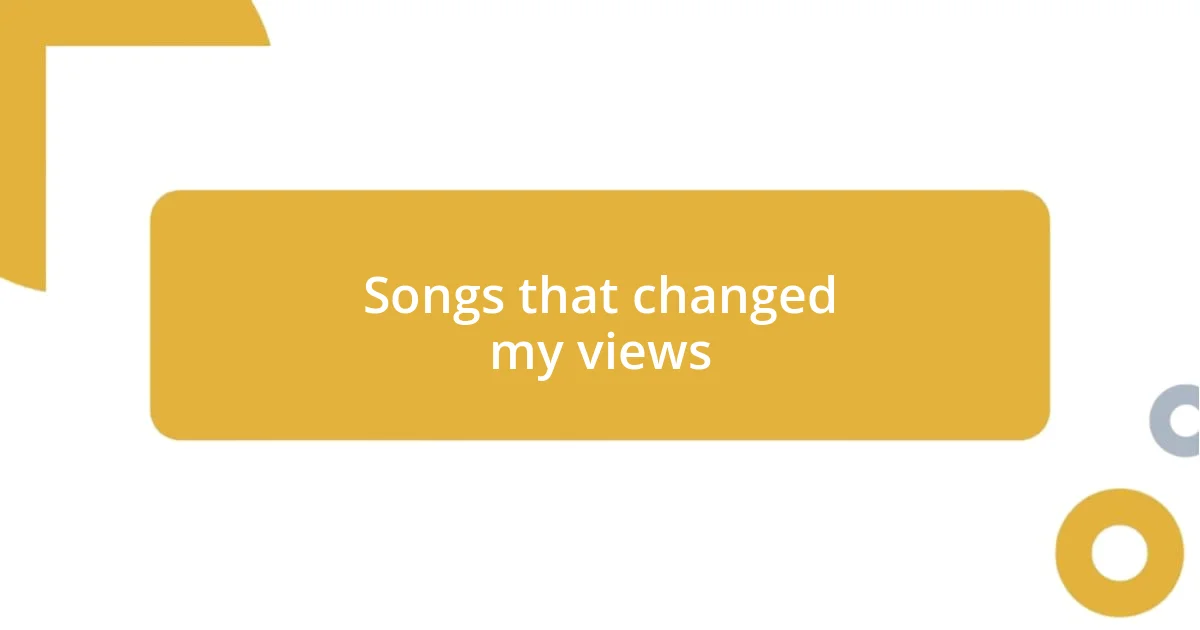
Songs that changed my views
Reflecting on “Hotel California” by The Eagles, I remember the first time its haunting melodies wrapped around me. I was lounging on my bed, headphones on, and as the lyrics spoke of paradise and entrapment, I couldn’t help but relate it to my own experiences of feeling both safe and suffocated in familiar places. It sparked a curiosity about the dualities in life—how something that seems perfect can hold darker undercurrents beneath the surface.
Then there’s “Go Your Own Way” by Fleetwood Mac, which reached me during a turbulent time in my friendships. There was one rainy afternoon when I played it on repeat, letting the lyrics seep into my consciousness. As I sang along, I recognized the importance of forging my own path, even when it was painful to say goodbye to certain connections. It felt like a liberating moment of clarity, as if the song was validating my need for independence while also reminding me that it’s okay to feel hurt.
Listening to “Stairway to Heaven” always transported me to a reflective space where I found myself pondering life’s big questions. One evening, I sat with my journal, the song playing softly in the background, and I wrote about my discoveries and fears. I vividly remember one line that struck me deeply—it made me reconsider my aspirations and the journey toward them. That night, I felt a powerful urge to seek more than just material success; I wanted meaning and purpose, and that realization was sparked by the very essence of that iconic track. How incredible that a song could guide me toward such profound personal insights!
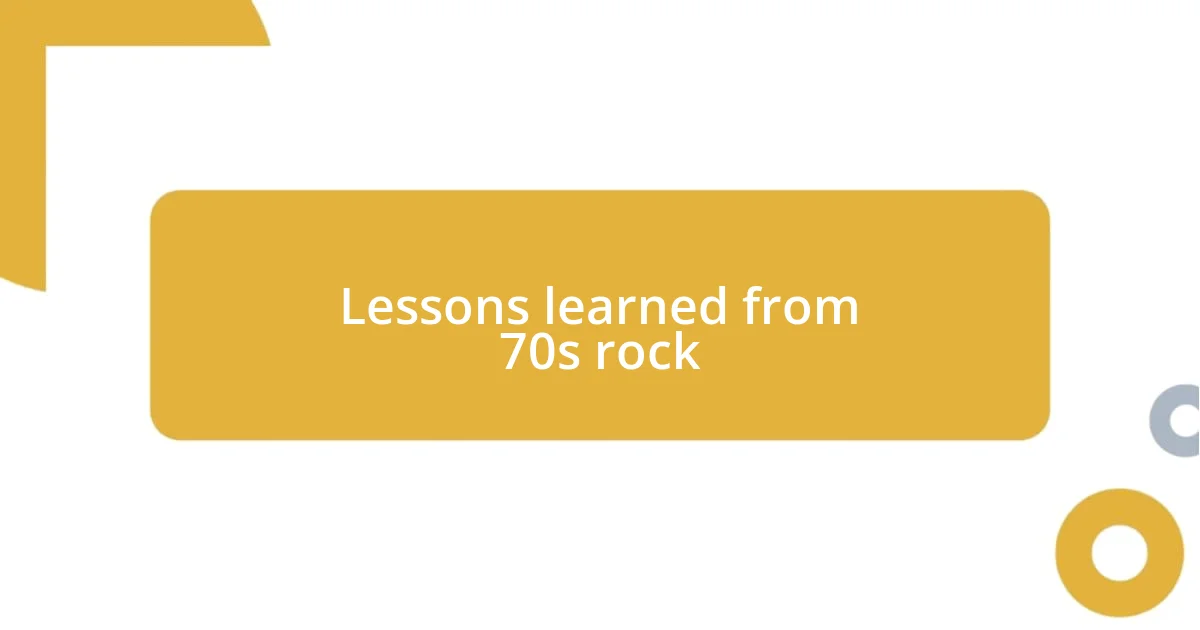
Lessons learned from 70s rock
Listening to 70s rock taught me the importance of vulnerability. I recall a rainy night when I first heard “Baba O’Riley” by The Who. The way Roger Daltrey’s voice soared through the chorus felt like a rallying cry to acknowledge my own struggles. Have you ever found strength in someone else’s pain? That song urged me to embrace my flaws and be open about my feelings, breaking free from the rigid expectations I’d placed upon myself.
There’s something remarkable about how music like “Imagine” by John Lennon can mold your worldview. I remember playing it at a particularly low point in my life, feeling hopeless about the state of the world. The lyrics, which painted such a vivid picture of peace and togetherness, made me question my own role in contributing to a better future. It was a gentle awakening—a reminder that change starts with individual choices. How could a simple melody inspire hope in such chaos?
The rebellious spirit of songs like “Ballad of Lucy Jordan” taught me about the complexities of womanhood and the passage of time. I distinctly remember my mother singing it wistfully while folding laundry; her voice trembled with emotion, and I could sense her own reflections about life’s choices. That experience dug deep into my awareness of how societal expectations can weigh heavily on women. Listening to that song opened my eyes to both the beauty and the struggles that make up our stories. It’s incredible how a three-minute track can encapsulate years of lived experience and pose the question, “What truly matters to me?”
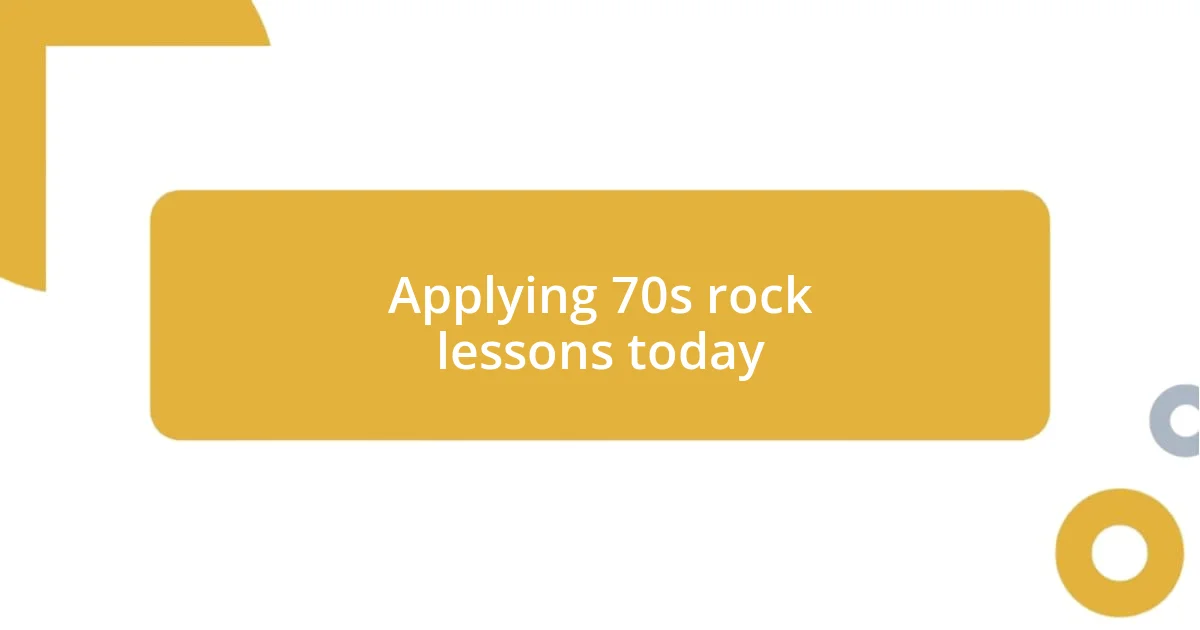
Applying 70s rock lessons today
Applying the lessons from 70s rock to my life today feels incredibly rewarding. I often find myself reflecting on the raw honesty of “Me and Bobby McGee” by Janis Joplin. The bittersweet reality of the lyrics resonates with me, especially when I think about the fleeting nature of relationships and experiences. Have you ever experienced a moment that felt perfect, only to realize it slipped through your fingers? That song nudges me to cherish the now while accepting that nothing lasts forever, which colors how I approach both my friendships and personal endeavors.
Take the anthem of defiance in “We Will Rock You” by Queen, which speaks volumes about resilience. I remember the time I faced a significant setback at work—just feeling defeated. A friend recommended I listen to that song, telling me it was about rising up and fighting back. That night, as I replayed it, I felt a spark ignite within me. It made me question how I respond to obstacles. Don’t we all need a little push sometimes? That track propelled me to tackle challenges head-on, motivating me to view failures as stepping stones rather than roadblocks.
Furthermore, “Landslide” by Fleetwood Mac deeply resonates with my thoughts on change and self-discovery. One crisp autumn afternoon, I was taking a solitary walk, and the song came on my playlist. Its gentle reflections on growing older made me consider the crossroads in my own life. I felt an urge to ask myself—what have I learned from my past? This song inspires me to embrace personal growth, reminding me that it’s okay to reassess and redefine who I am as I journey through life’s seasons.












